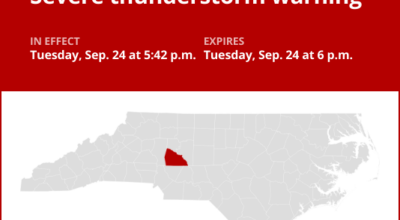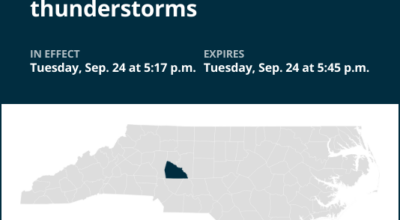Cease Fire program ‘active and ever-changing’ with training session upcoming, says NAACP’s Gemale Black
Published 12:10 am Sunday, March 27, 2022
SALISBURY — Though the pandemic has limited the scope of the city’s Cease Fire program, Salisbury-Rowan NAACP President Gemale Black says it’s active and ever-changing, with a training session on the horizon.
Black leads the program, which is a partnership with the Salisbury Police Department. Introduced in 2019, the Cease Fire initiative encourages Salisbury youth and adults to stop gun-related assault during the summer months. In June 2021, it became a year-round initiative. The program relies on data to address gun violence and crime in specific areas as well as community stakeholders who serve as de-escalators in the midst of potentially violent situations between related groups.
When the program launched, 20 individuals completed de-escalation training. For an upcoming session to be scheduled within the next month, Black said 12 are currently registered. Additionally, anywhere from 15 to 20 volunteers regularly attend canvassing and community outreach events, he added.
On March 14, the program held a canvassing event at Clancy Hills Apartments that saw around a dozen volunteers, not including law enforcement, who were able to talk with about 60 community members, Black said.
“Salisbury Cease Fire is active. We will always be in a stage of revamping,” Black said. “We look at the program on a continuing basis because our community needs change and we will continually adapt to fit those needs. We will continue to seek additional resources to enhance Salisbury Cease Fire for our ever-changing community.”
Earlier this month, members of Greensboro’s Gate City Coalition visited Salisbury to discuss their cure violence program, which consists of “violence interrupters,” or de-escalators, and outreach workers who help connect participants to various resources. The model seeks to address the root causes of violence, so services can help participants secure stable housing, educational and employment opportunities and work to get off probation, for example.
Black said he commends the work being done in Greensboro and the men who shared their story of re-routing themselves on the right path during the presentation to Salisbury City Council on March 15. However, he added that he’d like to have seen more data about how their program is reducing crime within their targeted neighborhoods and how crime affects the surrounding areas of those targeted areas.
“We will continue to look for additional funding opportunities and work with organizations to help target the underlying root social causes in our community,” Black said.
Among the differences between the Cease Fire program and a cure violence model is that cure violence programs are housed by a nonprofit agency and staff are paid, while Cease Fire relies on volunteers. Additionally, resources for cure violence are funneled from the nonprofit Cure Violence Global. With Cease Fire, operations are alongside law enforcement officers, while cure violence models operate independently of law enforcement.
Black said he welcomes any partnership to reduce crime in the city if it aligns with the Cease Fire approach of using law enforcement for such efforts.
“We recognize that the initiatives are the same with a few differences,” Black said. “One being Salisbury Cease Fire recognizes that law enforcement is essential in combating gun violence. We will continue to take a unique approach that fits our community as a whole.”
Police Chief Jerry Stokes said he’s glad to hear Greensboro seems to be having some success with its cure violence model. But what works for one community may not work for another, he added.
“We enjoy an excellent relationship with our community and I don’t see that we have the apparent concerns other cities may have about cooperation with law enforcement,” Stokes said. “What works for Greensboro may not be as much of a concern in Salisbury and each location has to use whatever works for them.”
But Stokes added that since the goal is to protect and serve the Salisbury community, the department welcomes “effective opportunities that would assist us in that goal.”
Stokes said the department tries to stay in line with current policing trends, which now point to a co-responder model of various forms. Co-responders are typically individuals with backgrounds in social work who can respond with police when they’re called to an incident where mental health treatment or crisis intervention is needed. He clarified that co-responders are not the same as de-escalators.
Using co-responders is an approach currently being taken in cities like Raleigh, Chapel Hill, Durham and Greenville.
“We are looking at how we could develop a co-responder model here, but that would be outside of our violent crime response and prevention efforts and more in line with dealing with those in the community experiencing mental health crisis rather than de-escalators,” Stokes said.
To learn more or consider volunteering, contact info@salisburyrowannaacp.org.
“Salisbury Cease Fire will continue to partner and welcome anyone who wants to reduce crime in our city because gun violence is not limited to one area and affects us all,” Black said.






